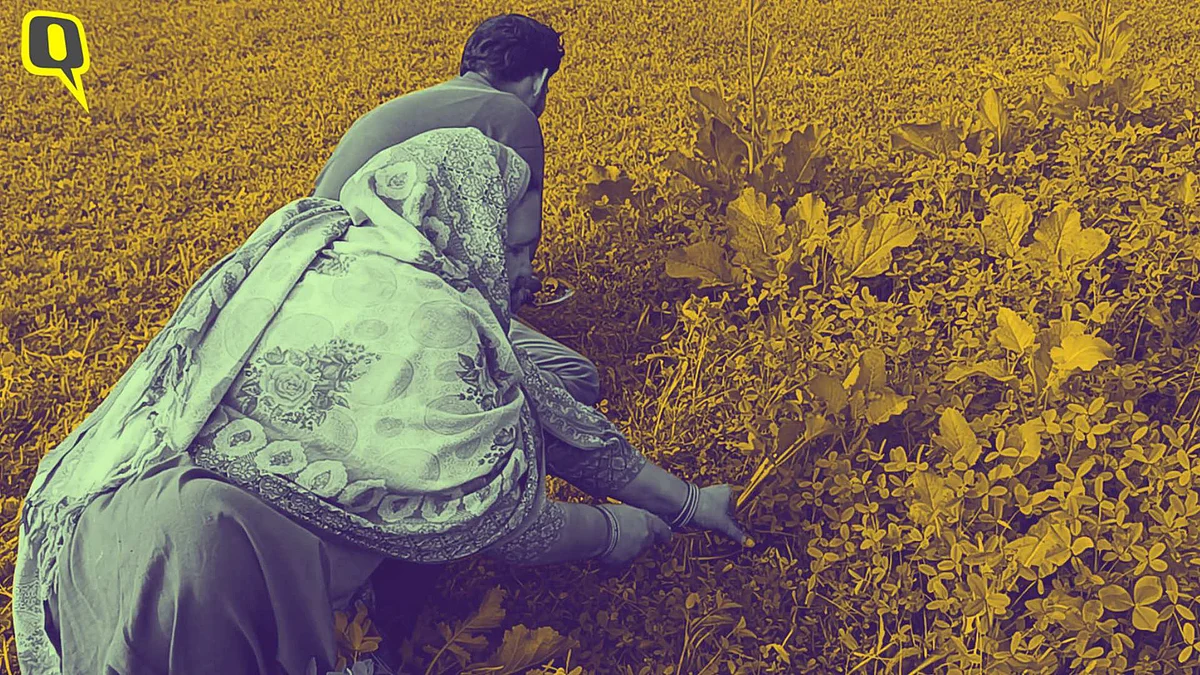Climate Change, Indo-Pak Border, and Dying Basmati Fields of Jammu's RS Pura
A drop in production. Dry, silted canals. Heatwaves. Rain deficit. Who’s listening to border farmers in crisis?

advertisement
Are we prepared for the climate crisis staring us in the face? The Quint wants to go big on telling the most important stories of our time. Support us to tell them. Become a member now.
Jammu's RS Pura region is known for its world-famous Basmati rice, aptly named 'RS Pura Basmati'. A crop that has sustained generations of farmers.
But today, unpredictable weather patterns, drying water sources, and border restrictions have made farming increasingly unsustainable, pushing farmers into losses they can no longer afford.
The crisis is not just about climate change but also about government inaction, the farmers allege, they as they struggle to make ends meet.
"The government talks about MSP but fails to implement it," says Karnel Das, 68, voicing the frustration of many farmers in the region.
Climate Change is Destroying RS Pura’s Crops
RS Pura’s main crops are Basmati rice, wheat, and paddy, but rising temperatures, irregular rainfall, and extreme weather events have thrown their cultivation cycles into disarray. Farmers say the past 2-4 years have been the worst, with many moving from small profits to mounting losses.
The numbers back their fears: Jammu and Kashmir saw a 29% rainfall deficit in 2024 alone, with January 2024 recording a shocking 91% shortfall, according to Faizan Arif Keng, an independent weather forecaster.
And with heatwaves becoming a regular occurrence, too, the crisis is deepening.
The Disappearing Lifeline: Ranbir Canal
Once the lifeline of RS Pura’s farms, the Ranbir Canal was designed to bring water from the Chenab River to agricultural lands. Today, it is drying up, and farmers blame the government’s failure to maintain it.
Ranbir Canal in RS Pura.
(Photo: Bashrat Amin)
This is the condition of the canal as on 16 January.
(Photo: Bashrat Amin)
Farmers allege that despite repeated complaints to the Irrigation Department, the issue remains unresolved. "We have visited block and district offices ample times, but nothing has been done. Zero," adds Mandev Singh.
However, Hafizullah Reshi, Executive Engineer of the Irrigation Division, dismisses these claims, stating: "These people just keep making up stories. They are responsible for polluting the canal by throwing in personal waste."
Groundwater is Vanishing, But Pump Sets Are Not the Answer
With rainfall failing and the canal system deteriorating, farmers have turned to pump sets for irrigation. But even that solution is proving unreliable.
The government has introduced a new subsidy scheme for solar-powered water pumps, offering an 80% subsidy. But farmers say the scheme is deeply flawed.
Farming Under Border Restrictions
As if climate change and water shortages weren’t enough, farmers near the India-Pakistan border also deal with severe restrictions on their working hours. Security forces mandate a 4 PM curfew, preventing farmers from tending to their fields when they need to the most.
The security measures stem from the fear of cross-border firing, but farmers argue that if there is fencing and a strong security presence, they should be allowed to work till dark.
"There should be a ceasefire on this border so that farmers can work peacefully," says 68-year-old Kernal Das from Chuwala village in RS Pura. "We are not getting proper rates, manure, or even water. We are the food providers of this country, but who are we providing for when nobody listens to us?"
With climate change worsening, water resources drying up, and farming becoming economically unviable, the future of RS Pura’s farmers looks bleak.
The farmers of RS Pura don’t want empty promises—they want real solutions. Will the government listen before it’s too late?